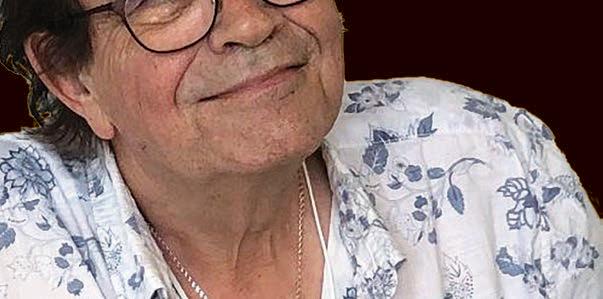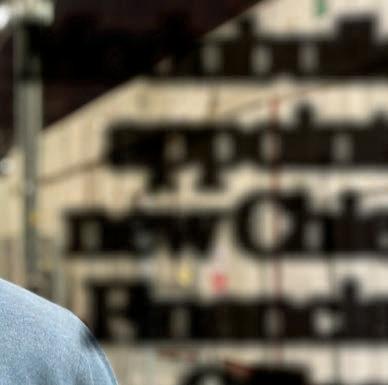
11 minute read
Paul Hopkins
The Fact OfThe Matter

Advertisement


PAUL HOPKINS PAUL HOPKINS When I’d ball my eyes out for poor Jesus
In the Catholic upbringing of my youth, there was no more an austere day than Good Friday. Curtains were drawn – as respect for the death of Christ – we kids were not allowed play football out on the road – indeed, play at all – and the edging Radio Tele s Eireann did not broadcast any programmes, though my mother left the TV switched on, the screen permanently showing a painting of the Cruci xion, a Caravaggio or a Diego Velazquez.
My brother and I would stare intently at the picture on the box and I, feeling so sorry for the poor man Jesus, would promise to give up me ‘auld sins’ and be good. My mother, meantime, resigned herself to her ‘sacri ce’, that there would be no episode of e Fugitive that night and Richard Kimble’s pursuit of the one-armed man would have to wait for another week. ere were the obligatory Stations of the Cross – not online as with Covid the last two years – my mother taking us to the church at 3pm, the time of day Christ drew his last breath, and we would go from one depiction of His agony to another, trying hard to ball our eyes out for Christ’s pitiful plight.
Back then there was never ever any doubt that God did exist, that Jesus did die on the Cross to give us eternal life, and that we would be damned to Hell if we did not believe.
Since then Ireland has grown up. We can laugh at the exploits of Father Ted and Mrs Brown’s Boys. e Catholic Church and its religious orders have been outed, not least in recent time with the horri c stories of Mother & Baby homes and correctional institutions. Married priests or those silenced by the Vatican because they dared speak the truth are now no bother to us, and we Catholics no longer breed like rabbits because Rome dictates contraception is wrong.
Even if there were no pandemic, churches would still be half empty, some demolished or sold o , and 700,000 people, north and south, say they have “no religion at all”.
Where do we now stand on Jesus might be a good question to ponder this Holy Week. Do we still believe He was the Son of God? Died and rose again? Do we believe that He even existed?
Such contentions have been argued for centuries by philosophers and theologians from Francis of Assisi to Martin Luther, Pierre Teilhard de Chardin to Richard Dawkins. ere is more evidence that Jesus of Nazareth certainly lived than for most famous gures of the ancient past. is evidence is of two kinds, according to the noted historian Paul L Maier: internal and external, or, if you will, sacred and secular. “In both cases, the total evidence is so overpowering, so absolute that only the shallowest of intellects would dare to deny Jesus’ existence,” says Maier.
On the sacred front, the most detailed record of Jesus’ life and ministry is recorded in the (known) Gospels. In addition, a number of early non-Christian sources name Him. at a few simple men, the four, arguably ve, Gospel writers, should in one generation have invented so powerful and appealing a personality, so lofty an ethic and so inspiring a vision of human brotherhood, would be a miracle far more incredible than any recorded in those Gospels.
Irish historian John Dominic Crossan, however, would argue with the ministry and divinity of Jesus. Crossan, who studied for the priesthood in America and was awarded a Doctorate of Divinity by Maynooth, is a notable advocate for a ‘noneschatological view’ of Jesus, a view that Christ was just an apocalyptic preacher.
Co-founder of the Jesus Seminar, now a global organisation of revisionist Biblical scholars, Crossan says Jesus was an “exploited peasant with an attitude” who didn’t perform many miracles, physically rise from the dead or die as punishment for humanity’s sins.
Jesus was extraordinary because of how he lived, not died, says Crossan, a native of Tipperary. “I cannot imagine a more miraculous life than nonviolent resistance to violence,” Crossan says. “I cannot imagine a bigger miracle than a man standing in front of a tank in Tiananmen Square.”
But let’s leave the last word to Albert Einstein, the German-born physicist who asserted: “I am a Jew, but I am enthralled by the luminous gure of the Nazarene. No one can read the Gospels without feeling the actual presence of Jesus. His personality pulsates in every word. No myth is lled with such life.”



'Urgent action is needed' on pig sector crisis
THE severe crisis facing the pig sector needs urgent action by the Government, according to a submission by Meat Industry Ireland (MII) to the Joint Oireachtas Committee on Agriculture, Food & the Marine in advance of its hearing on the challenges facing the pig industry.
While acknowledging that the Government has sought to support the sector, the package brought recently to Cabinet falls well short of current losses being incurred. The Government will need to be open to reviewing supports as circumstances evolve.
Rapidly rising feed, fuel, and transport costs, exacerbated by Russia’s war on the Ukraine, are crippling a sector that was already struggling with the challenges presented by Brexit and Covid disruption. The sector has also been contending with volatility in the Chinese market and the impact of African Swine Fever (ASF) outbreaks in several European markets.
Processors have done everything possible to support their producer suppliers, with Irish pig prices 10% above the EU average price since September, but this is not sufficient to bridge the losses being incurred due to the dramatic external input price shock.
Independent Teagasc analysis shows the sector has already incurring losses exceeding €60m. The Irish pig meat sector supports over 8,000 jobs in rural Ireland and is the third largest agricultural sector after beef and dairy, contributing almost €1bn in export earnings.
Cormac Healy, Senior Director at MII said: “Rocketing feed input costs have created an unbridgeable gap between production costs and pig prices, and whilst this may narrow in coming months the scale of current losses means external support from Government is urgently required.
“Producers have already incurred over €60m in losses and are being forced to exit the sector because of the unprecedent hike in feed costs. Irreparable damage will be done to a sector that is a key contributor to rural employment and export earnings,” he said.
MII is the trade association within Ibec representing primary pigmeat processors.

New 'living wage ' to be set before summer

THE Tanaiste has said that plan for a mandatory national 'living wage' will be brought to Government before the Dáil summer recess.
Tanaiste Leo Varadkar indicated that a future living wage rate may be set five years in advance, as had been done in the UK. He said this would give companies "the time to plan, prepare and adjust”.
The living wage is the minimum income necessary for a single adult worker in full-time employment to meet their basic needs and afford an acceptable standard of living.
It is unclear if the new living wage would replace the statutory minimum wage, which is €10.50 an hour.
Government sources said this decision would be taken by Cabinet.
Mr Varadkar said a new Low Pay Commission report showed the concept of a living wage could be traced back to Ancient Greece but is understood differently around the world. "In this respect, the Irish Government will be among the early movers in adopting a national, mandatory living wage,” he said, when recently delivering the Edward Phelan lecture at the Royal College of Physicians. "I intend to honour the Programme for Government commitment that we should do so.”
The Tánaiste and Enterprise, Trade and Employment Minister appeared to favour a living wage based on a percentage of the median wage.
He described this as simpler than basing it on a basket of goods.
Mr Varadkar said opinion was divided on how to calculate the living wage.
He said he saw merit in the basket of goods and services approach, although it would be "subjective”. He said there would be inconclusive debates about what should be in the basket and how much should be in it. "An alternative approach is setting the living wage as a percentage of the median wage,” he said. "This approach is simpler and provides certainty.”
The median wage is the salary in the middle of the full range of all workers' salaries across the economy.
Mr Varadkar said for the first time in many years, real living standards could fall this year and a comprehensive anti-inflation strategy was needed. "I do believe there should be pay rises and indeed further increases in pensions and welfare,” he said.
However, he believes it is a mistake to think pay rises will solve the problem of inflation. "Pay rises won't bring down the price of anything,” he said. "And pay rises could actually contribute to inflation and make the situation worse.”
Mr Varadkar said the tax burden on middle income earners in particular should be reduced. He said this was "so they can keep their pay rise if they get one and at least get something back in their pockets if they don't”. "I can't understand why the opposition parties continue to oppose the indexation of tax bands,” he said.

Modubuild appoints new Chief Financial Officer
THE Kilkenny headquartered engineering and construction company Modubuild, announced the expansion of its senior leadership team with the appointment of Michael Kilcommons (pictured) to the position of Chief Financial O cer (CFO).
Mr Kilcommons comes to Modubuild with more than 25 years of nancial and leadership experience.
Kevin Brennan, Co-Founder & CEO of Modubuild said: “I am very pleased to welcome Michael as our new CFO. is key appointment will further strengthen our senior leadership team as we embark on the next phase of our ambitious growth strategy. Michael brings with him a wealth of leadership, commercial and international nancial experience in a variety of businesses including those with similar growth trajectories to Modubuild.” Mr Kilcommons, prior to joining Modubuild, served as CFO of Merlyn Industries, Digicel Haiti, Innovu Group and Giftsdirect. He brings with him an exemplary record of nance and operations management success and a proven talent for aligning business strategy with established nance and operations management models.
Modubuild, which was named as one of Deloitte's Best Managed Companies 2021, has experienced very strong organic growth over recent years, tripling their turnover in the last three years, along with achieving an average of over 50% year on year growth over the last six years.
e company has delivered projects for global biopharma & technology companies across 11 countries to date and has a network of regional o ces in the Netherlands, Belgium, UK, Sweden, Finland & Spain.
Modubuild have been leading the way in high tech volumetric modular construction for a number of years, having made a multi million euro investment in their 140,000 square foot state of the art manufacturing facility in Castlecomer. ey specialise in rapid delivery of on and o site modular construction solutions for large and complex projects within the life sciences and data centre industries.
Modubuild hasa network of regional o ces in Netherlands, UK, Belgium, Sweden and Finland.
€2.8m Arts partnership for Decade of Centenaries
THE Arts Council and the Department of Tourism, Culture, Arts, Gaeltacht, Sport and Media announced today that they will jointly invest €2.8 million in a major programme of events to mark the nal phase of the Decade Of Centenaries programme. e programme, Art: 2023, is a call to artists and arts organisations with an opportunity to create new and exciting work of ambition and scale while re ecting on the themes of the Decade oO Centenaries programme 2012-2023. e Chair of the Arts Council, Prof. Kevin Rafter, said: “With this scheme the Arts Council is looking to artists and arts organisations to create new work of ambition and scale to mark key moments in the foundation of the Irish State. e arts can help us better understand our contested histories and challenge how we learn from this past.”
Catherine Martin, TD the Minister for Tourism, Culture, Arts, Gaeltacht, Sport and Media said: “Artists have had, and continue to have, an important role in encouraging re ection, exploration and debate during the Decade of Centenaries, allowing people of all traditions to question and consider issues that may be challenging. is is a vital aspect of the Decade of Centenaries Programme.
“ e Art: 2023 partnership with the Arts Council is a timely one, in this nal phase of the Decade of Centenaries Programme 2012-2023, as we navigate complex themes and commemoration of signi cant historical events. e Expert Advisory Group on Centenary Commemorations has placed great value on the vital role that artists play as ‘cultural brokers’ – facilitating conversations and engaging communities in a meaningful way through creative expression.,” she said.
“ I am delighted to be supporting the Art: 2023 partnership with the Arts Council and I look forward to seeing the nished work and indeed the processes involved in making the work over the coming months as we add to the positive and rich cultural legacy of the Decade of Centenaries Programme.” *Further information on the Decade of Centenaries Programme is available at www. decadeofcentenaries.com.










